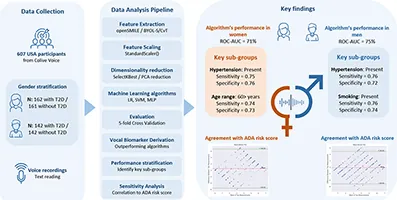
Revolutionary AI Algorithm Developed in Luxembourg Could Transform Diabetes Screening!
2024-12-30
Author: John Tan
Introduction
Scientists at the Luxembourg Institute of Health have made a significant breakthrough in the fight against Type 2 Diabetes (T2D) with the development of a cutting-edge voice-based artificial intelligence (AI) algorithm. This innovative method is set to revolutionize diabetes screening by offering an accurate, noninvasive solution that could be both more accessible and affordable—particularly in underserved communities.
Global Health Issue
Globally, Type 2 Diabetes has become a formidable health issue, with around 400 million cases going undiagnosed. Such delays can lead to serious complications, including heart disease and nerve damage, ultimately raising healthcare costs and mortality rates. Traditional screening methods often rely on blood tests, which can be prohibitively expensive and challenging to implement in low-resource settings.
The Study and Results
Addressing these barriers, the research team, led by Abir Elbeji and Dr. Guy Fagherazzi, harnessed AI to identify subtle changes in voice patterns that indicate the presence of T2D. Utilizing advanced machine learning techniques, the team uncovered unique vocal biomarkers associated with the disease. Their study, published in the prestigious journal PLOS Digital Health on December 19, involved analyzing speech samples from over 600 participants across the United States. Astonishingly, the AI algorithm achieved predictive accuracy that rivals existing risk assessment tools recommended by the American Diabetes Association (ADA). Notably, detection rates were particularly high among women over 60 and those with high blood pressure.
Expert Opinions
Dr. Guy Fagherazzi highlighted the transformative potential of this research, stating, "This represents a significant advancement in diabetes care. By merging AI with digital phenotyping, we're moving towards a more inclusive and cost-effective strategy for early diagnosis and prevention. The ability to merely speak into a microphone could enhance healthcare access for millions worldwide."
Future Directions
Looking to the future, the research team aims to fine-tune the algorithm not only to identify prediabetes but also to catch undiagnosed T2D cases even earlier. Plans are already underway to expand their efforts to include diverse populations and multiple languages, further broadening the reach of this groundbreaking technology.
Support and Collaboration
The Colive Voice program stands at the forefront of harnessing vocal biomarkers for diagnosing various chronic conditions, underscoring the pivotal role AI can play in healthcare diagnostics. The initiative has gained crucial support from organizations such as the French-speaking Diabetes Society, the Luxembourg Diabetes Society, and the Luxembourg Diabetes Association, showcasing a collaborative approach to address one of the essential health crises of our time.
Conclusion
As this technology continues to advance, it holds the promise to fundamentally reshape diabetes screening, making it widely accessible and alleviating pressures on traditional healthcare systems. Is your voice the key to your health? The implications are vast, and the future of diabetes detection may just be a word away!


 Brasil (PT)
Brasil (PT)
 Canada (EN)
Canada (EN)
 Chile (ES)
Chile (ES)
 Česko (CS)
Česko (CS)
 대한민국 (KO)
대한민국 (KO)
 España (ES)
España (ES)
 France (FR)
France (FR)
 Hong Kong (EN)
Hong Kong (EN)
 Italia (IT)
Italia (IT)
 日本 (JA)
日本 (JA)
 Magyarország (HU)
Magyarország (HU)
 Norge (NO)
Norge (NO)
 Polska (PL)
Polska (PL)
 Schweiz (DE)
Schweiz (DE)
 Singapore (EN)
Singapore (EN)
 Sverige (SV)
Sverige (SV)
 Suomi (FI)
Suomi (FI)
 Türkiye (TR)
Türkiye (TR)
 الإمارات العربية المتحدة (AR)
الإمارات العربية المتحدة (AR)